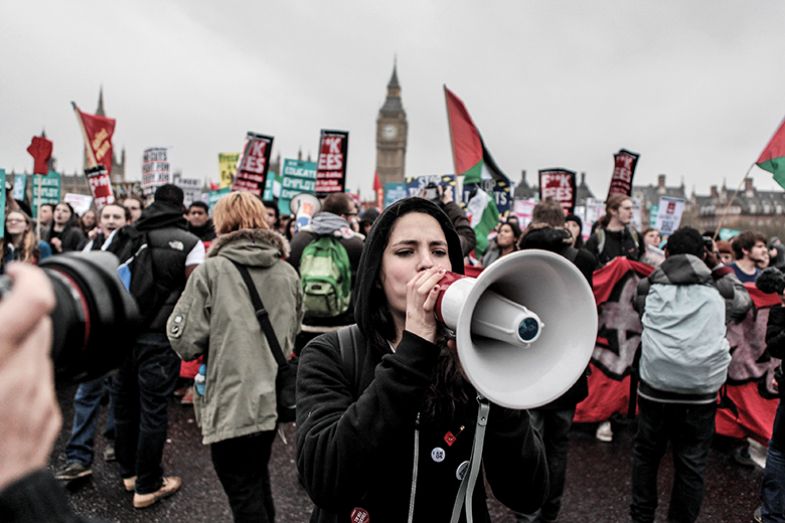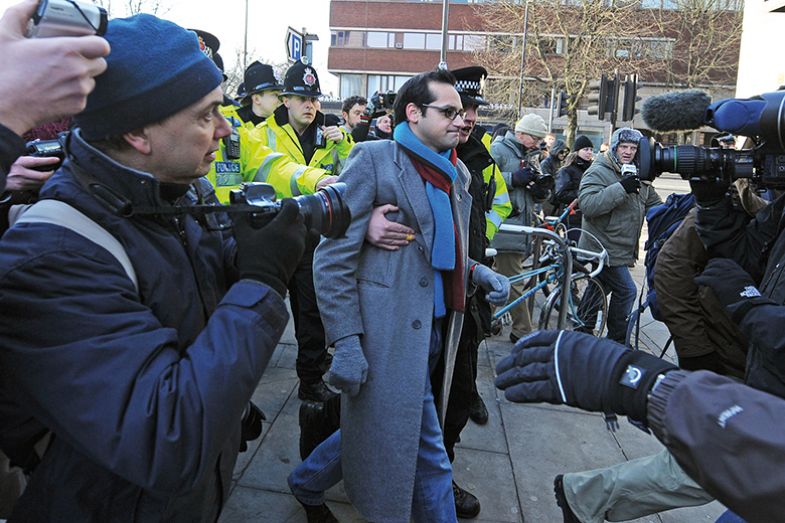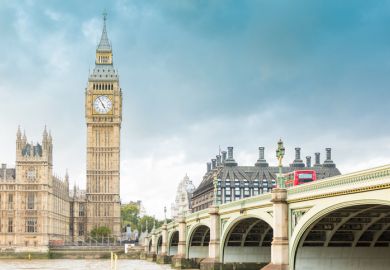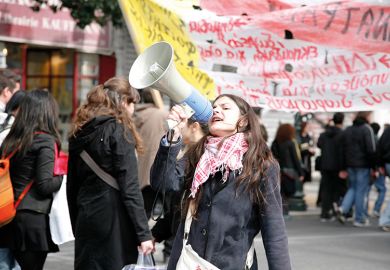In the midst of the latest wrangles over higher education funding in England, the National Union of Students rallied its members one morning in May to register their disapproval of the government’s record.
The plan was to hand a report card into the Department for Education with the word “fail” emblazoned across the top. “F”s were awarded to ministers for plans to level up the country, provide equitable access to education, ensure social security for students and secure a future for young people.
Students were called to the department’s building in Whitehall, yards from the site of one of the largest student protests in recent history, when the NUS brought 50,000 people on to the streets to oppose the trebling of tuition fees in 2010.
Times Higher Education arrived early for the latest planned protest, but only a few civil servants were present on an otherwise deserted street. Ten minutes later, as THE was investigating whether the students were gathering elsewhere, an NUS press officer texted to say that they had been and gone and that he was sorry to have missed THE. A lone security guard at the door of the department later confirmed that he was there because the department had heard there might be protests. But he hadn’t seen anyone yet.
Weeks later, the Conservative government suspended all dialogue with the NUS. The trigger was the union’s alleged antisemitism. But observers saw the move as the inevitable conclusion of a wider parting of the ways between student and government politicians, not just in ideological terms but also regarding their interest in engaging with each other at all.
The electoral participation of young people – who still make up the majority of the student population worldwide – is low and declining in many countries. Nevertheless, students are highly engaged. The past decade has seen a swell of on-campus activism, from South Africa’s Fees Must Fall campaign to the #MeToo campaign, climate strikes and the decolonisation movements that have forced large institutions to assess their historic links to slavery.
“This generation cares deeply about many issues: they are not an apathetic generation, but they are politically cynical,” says author Paul Loeb, who has studied American campus activism since the 1990s. Voting at on-campus polling stations has risen during the past three presidential cycles, for instance, but Loeb says there is still deep disillusionment with the political system, which he blames on the toxicity of the debate in recent years.
“Students could say, ‘These are very close votes and if I could influence one senator, I could have an influence over the entire legislative voice,’” Loeb says. “They should feel powerful because this is such a closely divided political landscape. Instead, they feel powerless because they don’t see anything being achieved, and issues they care deeply about are not being addressed.”
That disillusion with mainstream politics also has its impact on established student representative bodies. Students favour the purism of participating in social movements rather than organisations, Loeb says, because the former involves advocating directly for what they believe without having to engage with the messy compromises of political systems.
Organisations, of course, also struggle to be the broad churches they need to be if they are to represent constituencies that have as many points of contention as agreement. In the case of the NUS, recent events that prompted anger in the Jewish community – including the uncovering of an old tweet sent by NUS president-elect Shaima Dallali that referenced a massacre of Jewish people – are “symptomatic of a broader cultural issue within key parts of the student movement”, according to Nina Freedman, president of the Union of Jewish Students. She says Jewish activists and officers feel bullied and face “microaggressions and outright antisemitism from the NUS activists”, leaving them feeling that the NUS is not a safe space for them.
With the help of Freedman, who still believes it can change, the organisation has launched two investigations and has stressed that antisemitism has no place within the student movement. And NUS supporters say the union is engaged in creating an alternative to the established education system, which inevitably comes with conflict.
But critics feel the once-mighty union – which is celebrating its centenary year this year – has lost its way amid such wrangles over identity politics and student disengagement from mainstream politics. They fear that irrelevance may become the fate of an organisation whose past presidents include the likes of former Labour home secretaries Jack Straw (president between 1969 and 1971) and Charles Clarke (1975-77), as well as current shadow secretary for health and social care Wes Streeting (2008-10), widely tipped as a future Labour Party leader.
And while the mantra of listening to students has perhaps never been more frequently repeated across global higher education, the fear is that the decline of established student bodies could result in students’ views on bread-and-butter issues – such as marking, assessment, teaching and fees – going unheard by ministers and university managers.
“The very sad thing is that if the National Union of Students didn’t exist, then you’d need to create one,” comments Aaron Porter, who was NUS president at the time of the 2010 fees protest – of whom, more later.

Students’ views were particularly difficult to hear as campuses locked down during the pandemic. For that reason, Hillary Gyebi-Ababio found it extremely hard to fulfil the “dream and vision” with which she began her two-year term as current vice-president for education at the NUS: “being among students as much as I could be”. But she found social media a godsend, allowing her to remain tapped in to students’ concerns.
One big issue that emerged during the pandemic was the fact that many students were still being asked to pay for university accommodation despite living back at home, prompting rent strikes at some universities. The NUS also expressed its support for the University and College Union’s industrial action around academic pensions, pay, workload, equality and casualisation. And it threw its weight behind campaigns for higher education that is “free, lifelong, accessible, democratised and decolonised”. She is convinced that this list genuinely reflects the majority of students’ priorities “because students make the decisions, not us: they set the agenda…I have the confidence to say we have good representation, especially from a liberation-focused point of view. The most vulnerable students, who don’t often have a voice: we have given them a space where they can be heard…Students are ahead of the curve in all of these things. That’s an incredible thing to witness, facilitate and be a part of.”
Gyebi-Ababio concedes that the government in England “has shown increasing resistance to students and student activists”. But while she came to the job thinking that being in the room with important people was the single most important factor in securing change, now she’s not so sure.
“Often when you have a seat at the table, it gets harder and harder to feel like you can oppose or push back on things you know you are fighting against, and not feel complicit in the decisions that are causing them,” she says. “I believe in direct action with all my heart. The more students disrupt, the more they feel empowered to actually create an alternative. I think that is powerful.”
Yet such high ideals inevitably bring students’ unions into conflict with government – and their reliance for their funding on students, universities and, in publicly funded systems, taxes makes them vulnerable to political vindictiveness.
NUS Australia president Georgie Beatty says that another victory for Australia’s centre-right Liberal-National coalition in May’s general election could have been the death knell for her organisation as it could have meant further changes to the Student Services and Amenities Fee (SSAF), which helps fund students’ unions.
Membership of a students’ union was once compulsory in Australia, but this was changed by John Howard’s Liberal-National government in 2006, in a move that was widely seen as retaliation for the anti-government campaigns run by the NUS’ predecessor organisation, the Australian Union of Students, during the 1970s (the NUS was formed in 1987 after the AUS collapsed in 1984).
In a single moment, millions of dollars were wiped off the budgets of students’ unions around the country, causing them, in turn, to struggle to make their designated contributions to the national body. And although she was only a toddler at the time, the scars from this period run deep for Beatty. Liberal-National ministers “don’t listen to us; they never invite us to anything”, she complains. “It would be ideal for them for us not to exist – and they can make us not exist.”
She admits that she never passed up “an opportunity to blast [former prime minister] Scott Morrison” and concedes that it might have been “to my detriment and the union’s detriment. But we are not an apolitical organisation. We are very, very political. The [Liberal Party] don’t believe in student unionism and aren’t involved and, therefore, we freely attacked them.”
But are student bodies missing a trick by refusing to engage more constructively? After all, ministers are often at pains to show themselves as being on the side of students. A case in point is England’s creation of the Office for Students as a replacement for the Higher Education Funding Council for England in the wake of the 2011 White Paper entitled Students at the Heart of the System.
While reluctant to criticise Beatty’s approach to the role, Sophie Johnston, who served as NUS Australia president in 2017, says she took a markedly different approach. She was the first president for five years to meet directly with the Australian education minister as she sought to undo the perception that the student movement was “just a bunch of lefty radicals”.
“Students saw the NUS as being a bit embroiled in these debates that weren’t affecting students,” she says. “I spent a lot of time re-educating people on what the NUS was about. The ideas we were pushing were still very progressive, but I was trying to change the perception that we would just jump on board with whatever issue seemed sexy in the radical movement at the time.”
Part of her approach was to get into the room with people who didn’t agree with her and find ways of communicating with them, even if she was criticised for it.
“While I don’t think we could ever convince the minister in those meetings that they should adopt what we were asking for, I think it’s important to be able to be present in that landscape and make yourself known. It also gives you a better understanding of what they were going to do next, what their priorities were, so we could think about how to deal with it,” she says.

Porter also had regular meetings with ministers during his time as NUS president, personally warning then-prime minister David Cameron and his deputy, Nick Clegg, in Downing Street that the tripling of tuition fees would destroy “a fairer, more affordable, sustainable system”. And he had his fair share of critics; at the height of the row over student fees, he received death threats for his refusal to call for free education.
Often accused of being a wannabe New Labour politician, Porter has actually gone on to a career in higher education management and now sits on various university boards. Yet, even 12 years on from the fee protests, he occasionally falls back into presidential mode, reeling off well-worn arguments such as that he didn’t feel that refuse collectors should have to pay for someone else to go to university.
Although higher fees were eventually passed by the Conservative-Liberal Democrat coalition government, Porter points out that his relentless lobbying campaign won several concessions, including fees of £9,000, rather than the proposed £12,000, and a higher wage threshold of £25,000 before graduates had to start repaying anything. The NUS was also instrumental in inflicting huge reputational damage on the Liberal Democrats, whose MPs broke the promise they made before the 2010 general election to vote against fees.
“There were moments when we thought we might be close to defeating the government,” Porter says, referencing the tight parliamentary arithmetic the government faced at the time. “In the end, it was one of the closest votes the coalition faced. If it had come later on, I actually think we might have beaten them. But there was so much riding on it – the ability of the government to continue to function – that if they had lost a landmark bit of legislation within six months [of forming a government], I think the coalition might have unravelled.”
According to Porter, the fact that he and his predecessor, Streeting, designed an alternative fee model, in the form of a graduate tax, was crucial to ensuring that MPs of all stripes took the NUS seriously.
“If the NUS’ position is that ‘we want fees scrapped and are not engaging in any sort of discussion other than that’, you can’t have an interesting debate. It takes 30 seconds; you set out your view, someone disagrees with it and that’s it,” he says.
But he does admit that the moderate positions he and other previous leaders adopted may be partly to blame for the more radicalised stance of the modern-day NUS.
“There is a legacy of the NUS engaging pragmatically over the tuition fee reforms and not getting what it wanted, so why would it do that again?” he asks, rhetorically. “My point would be that we did secure some changes, and if you completely abdicate yourself from any engagement then you are not going to get any change, so better to have some.”
On the other side of the negotiating table in 2010 sat Nick Hillman, then a special adviser to universities and science minister David Willetts and now director of the Higher Education Policy Institute. He remembers relations with the NUS being cordial: “David Willetts was always someone who wanted to keep lines of communication to the NUS open. He enjoyed spending time with students and talking to them about their concerns – including when they disagreed with him,” he says.
While he believes the NUS’ graduate tax proposal would never have been implemented by a Conservative government because of the amount of redistribution it entailed, Hillman says “it did give you a foundation on which to have reasonable, rational conversation, and it was a good thing they did it.”
Porter sees the changes being introduced in England now – which will mean graduates paying back loans for longer, and from a lower earnings threshold – as the most significant since the fee trebling. But, this time, he notes, the student voice on the measures is conspicuous by its apparent absence. This, he admits, is partly due to the dominance of the headlines by Covid and, more recently, Ukraine and the cost of living crisis. But, according to Porter, it is also down to what the NUS itself views as important.
“The biggest issue the NUS talks about now is identity politics,” he says. “In some ways, that is a reflection of society; young people are clearly and rightly concerned about issues to do with their own identity and that has clearly influenced the sorts of issues the NUS is talking about. But it is a national education representative body, and my personal view is that it needs to strike a better balance between issues in the classroom against issues of identity.”
For Hillman, the NUS had a chance when the higher fees came in to position itself as a consumer champion, given that students were suddenly more focused on getting good value from their education. But now “no one there seems interested in this [approach]. It’s a great shame. I hope it can be salvaged.”
And, echoing Porter, he adds: “If the NUS were to collapse, I think there would be a strong case for reinventing it from the ground up.”
But can a student body be reinvented from scratch, or does it inevitably lose influence accrued over time?
Before it disappeared earlier this year, the Harvard Undergraduate Council (known as the UC) had the kind of polished website typical of modern-day highly professional student bodies. There were adverts for upcoming sports matches, resources on everything from studying abroad to sexual health, and pictures of smiling representatives, including the moustachioed Michael Cheng, who was what turned out to be the body’s last president.
The only sign that something was wrong was an incongruous message, posted in red text: “Bye y’all,” it said. “Had a fun 40 years :), love you <3.”
Cheng, who declined to be interviewed by THE for this article, won a campus-wide vote to deliver on his promise to dissolve the four-decade old council – citing a history of infighting, inefficiency and misconduct – and replace it with a new body, the Harvard Undergraduate Association, with a much smaller team of representatives.
The criticisms of the UC were the same as those heard time and again about most student bodies, according to Samuel Taylor, an undergraduate who served on the council.
“I think people saw it as inefficient, as unable to achieve the change they wanted to see,” he says, adding that it also had a reputation for being “a training and breeding ground for political science students training to run for real politics later on”.
But Taylor insists that this view that council members were only out to further their own careers was “a little bit too cynical”; most were giving up their free time “out of a desire to make things better”. And while council members agreed that there was a need for reform, Taylor adds, the student body more generally didn’t see the good work the UC did. He likens the dissolution vote – which was won by a margin of 76 per cent to 24 per cent – to Brexit, in that most voted for change because they were dissatisfied, but “didn’t really understand the implications”.
“The undergraduate council had, purely by virtue of being a 40-year organisation, built up a huge amount of institutional staying power with the university,” he says. “Even if the council itself was sometimes ineffective, if members spoke out on student issues, they were usually heard out by the administration. I’m a little bit concerned that a lot of that power and recognition will slip away now that there’s a new group in town [the Harvard Undergraduate Association] with no backing or reaffirmation from the students.”
The consequences have already been seen, according to Taylor, in the university’s decision to scrap “shopping week”, a Harvard tradition that allowed students to try out classes in the first week before committing for the semester. The UC had led a successful campaign to prevent a similar move in 2017.
For as long as students have organised politically, the process has always been fraught and haphazard. But how much more fraught and haphazard might it become if students’ representative bodies refuse to even engage with authority as they push an identity-driven agenda that puts them in conflict not only with governments and university management but even, in some cases, with significant sections of the students they are supposed to represent?
While single-issue campaigns have been effective at capturing the limelight and securing concessions while the pressure is on, their prominence quickly dissipates as the students who drive them graduate, leaving no formal structures for peers to take on. The fear is that only official student advocacy groups have the staying power and institutional know-how to bring about lasting change.
Yet whatever the current perils, NUS Australia’s Beatty is confident that students will continue to organise because their lives are “inherently political”.
“You might be in classes that are oversized,” she says. “Your tutorial teacher might change a lot because there’s staff insecurity. You might be unable to switch course because they are being cut. All of these things compound [each other]. There’s a lot of anger, and where there’s anger, there’s student politics.”
Register to continue
Why register?
- Registration is free and only takes a moment
- Once registered, you can read 3 articles a month
- Sign up for our newsletter
Subscribe
Or subscribe for unlimited access to:
- Unlimited access to news, views, insights & reviews
- Digital editions
- Digital access to THE’s university and college rankings analysis
Already registered or a current subscriber?








